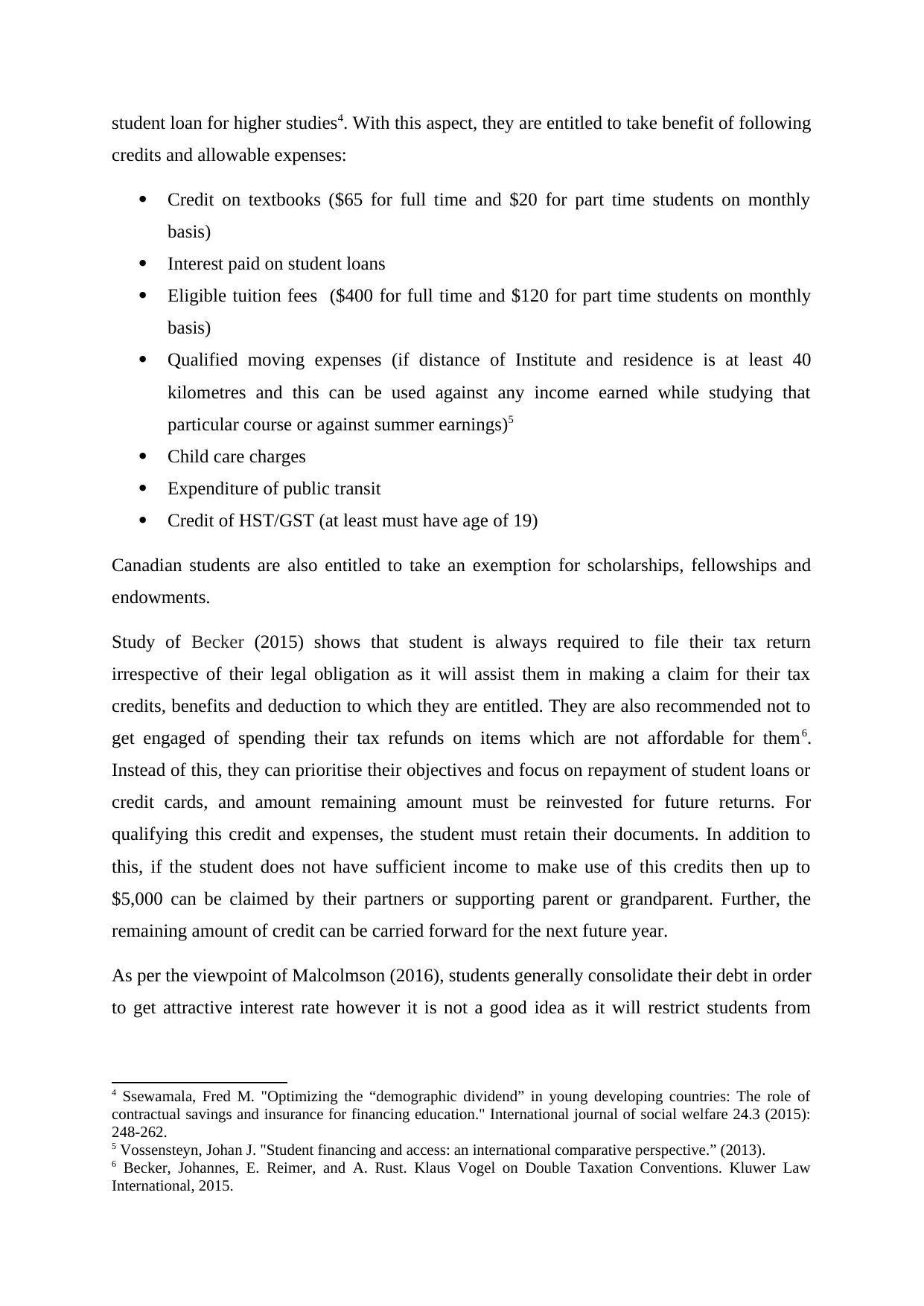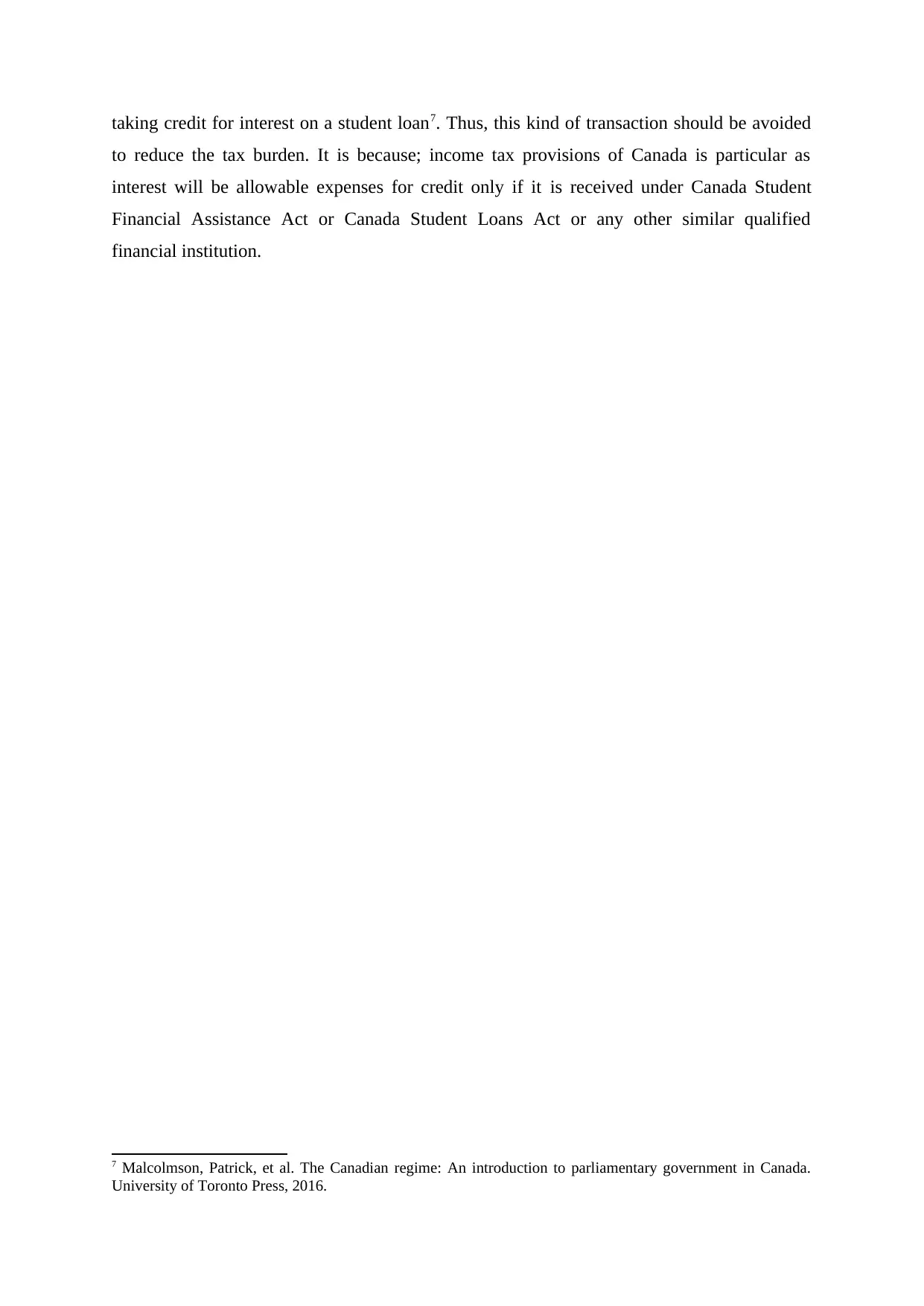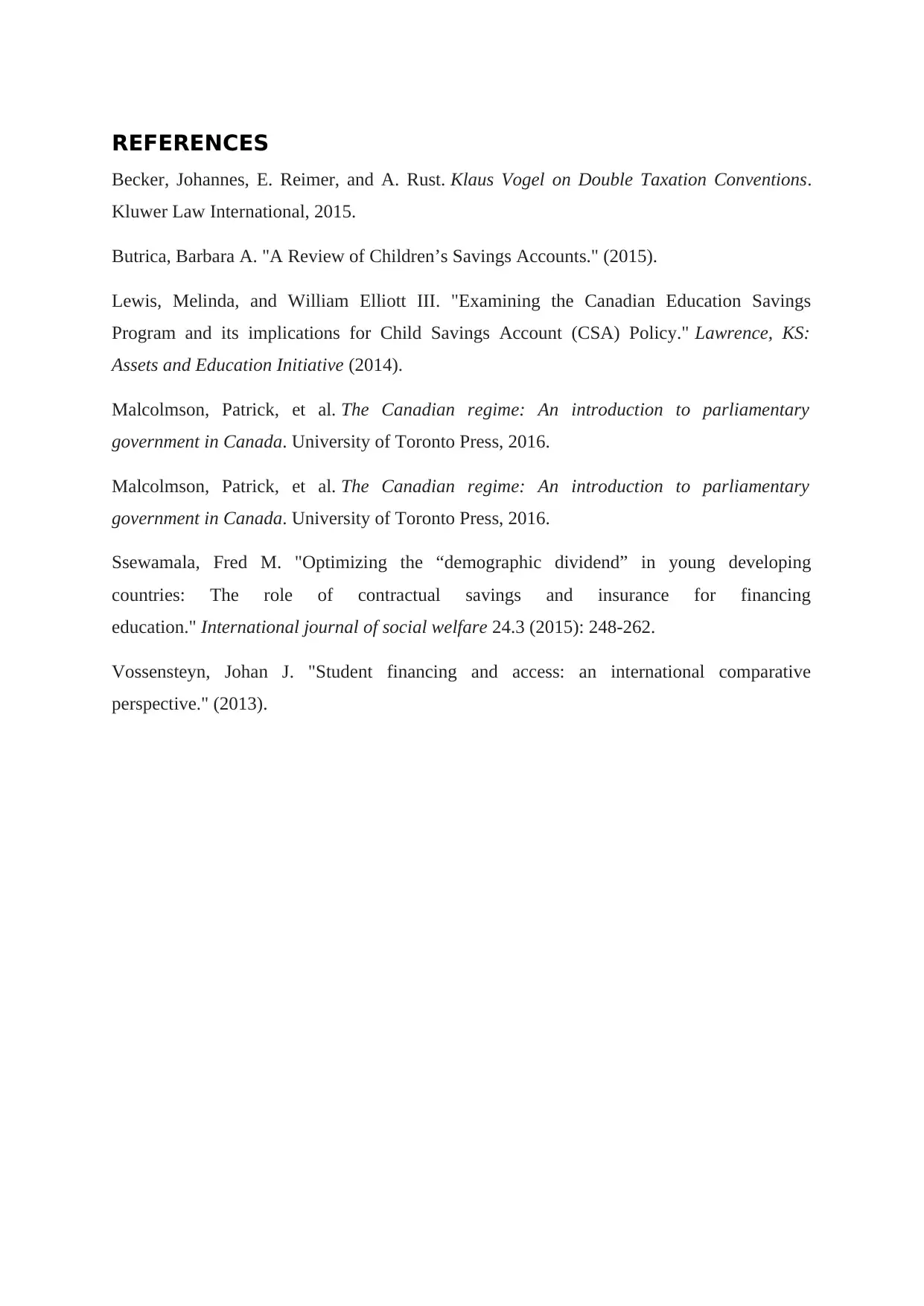Tax Filing Guide for Canadian Students: Navigating Tax Laws
VerifiedAdded on 2020/03/04
|5
|1032
|85
Essay
AI Summary
This essay examines the critical issue of tax filing for Canadian students, emphasizing their legal obligations and available benefits. It highlights that students must file tax returns to access credits like textbook amounts, student loan interest, and tuition fees. Various filing methods such as NETFILE and EFILE are discussed, with a recommendation for students to use NETFILE due to its cost-effectiveness. The essay underscores the importance of filing before the deadline to avoid penalties and delays in receiving credits. It also advises students to prioritize debt repayment and reinvestment over unnecessary spending of tax refunds. The essay further explains that unused credits can be transferred to supporting family members or carried forward. It cautions against debt consolidation, which may hinder the ability to claim interest on student loans. The analysis references Canadian tax laws and scholarly articles to support its arguments, providing a comprehensive overview of tax filing for Canadian students.

Personal finance
Paraphrase This Document
Need a fresh take? Get an instant paraphrase of this document with our AI Paraphraser

Tax filing is a vital issue faced by Canadian students as they are not aware of the tax
provisions and its impact. Being a student, instead of relying on parents for tax filing, they
are required to take a proactive approach towards their tax obligations. In accordance with the
study of Butrica (2015), irrespective of their age or income, they are required to file tax return
in order to attain various tax benefits1.
According to the Canadian tax law; students have legal obligations to file their tax return if
they satisfy any one of the following situations:
They are required to pay tax for the year
They have not made repayment of all amounts withdrawn from RRSP (registered
retirement savings plan) belong to lifelong learning plan
They are required to make contribution in CPP (Canada Pension Plan)
Students have received advance payments related to working income tax benefit
(WITB)
If one of the above described aspects is satisfied, then return can be filed by students by
making use of NETFILE or EFILE or through the paper return. In the option of EFILE, the
service provider can complete and file the return on behalf of the student in against of
charging a fee. On the other hand, in the option of NETFILE, the student has to complete and
file their tax return by making use of web application or tax preparation software2. Students
are recommended to make use of NETFILE as it is easy and cost savvy process because
generally, they do not have complex tax transactions.
By considering the tax norms of Canada; usually, the due date for filing tax is on or before
30th April of the following year. In case if the student files their return after the due date, then
in such situation their credits and tax benefits (such as Canada child tax benefit payments and
HST/GST credits) will be delayed3. These advantages are inclusive of payments certain from
the territorial or provincial program. Along with this; they will be liable to pay the penalty
and interest charges for late filing.
Provisions of Canadian taxation provides various benefits to students through which effective
financial planning can be done to save taxes by making use of available credits and allowable
expenses. Most of the student do part time jobs to finance their daily expenses and take a
1 Butrica, Barbara A. "A Review of Children’s Savings Accounts." (2015).
2 Malcolmson, Patrick, et al. The Canadian regime: An introduction to parliamentary government in Canada.
University of Toronto Press, 2016.
3 Lewis, Melinda, and William Elliott III. "Examining the Canadian Education Savings Program and its
implications for Child Savings Account (CSA) Policy." Lawrence, KS: Assets and Education Initiative (2014).
provisions and its impact. Being a student, instead of relying on parents for tax filing, they
are required to take a proactive approach towards their tax obligations. In accordance with the
study of Butrica (2015), irrespective of their age or income, they are required to file tax return
in order to attain various tax benefits1.
According to the Canadian tax law; students have legal obligations to file their tax return if
they satisfy any one of the following situations:
They are required to pay tax for the year
They have not made repayment of all amounts withdrawn from RRSP (registered
retirement savings plan) belong to lifelong learning plan
They are required to make contribution in CPP (Canada Pension Plan)
Students have received advance payments related to working income tax benefit
(WITB)
If one of the above described aspects is satisfied, then return can be filed by students by
making use of NETFILE or EFILE or through the paper return. In the option of EFILE, the
service provider can complete and file the return on behalf of the student in against of
charging a fee. On the other hand, in the option of NETFILE, the student has to complete and
file their tax return by making use of web application or tax preparation software2. Students
are recommended to make use of NETFILE as it is easy and cost savvy process because
generally, they do not have complex tax transactions.
By considering the tax norms of Canada; usually, the due date for filing tax is on or before
30th April of the following year. In case if the student files their return after the due date, then
in such situation their credits and tax benefits (such as Canada child tax benefit payments and
HST/GST credits) will be delayed3. These advantages are inclusive of payments certain from
the territorial or provincial program. Along with this; they will be liable to pay the penalty
and interest charges for late filing.
Provisions of Canadian taxation provides various benefits to students through which effective
financial planning can be done to save taxes by making use of available credits and allowable
expenses. Most of the student do part time jobs to finance their daily expenses and take a
1 Butrica, Barbara A. "A Review of Children’s Savings Accounts." (2015).
2 Malcolmson, Patrick, et al. The Canadian regime: An introduction to parliamentary government in Canada.
University of Toronto Press, 2016.
3 Lewis, Melinda, and William Elliott III. "Examining the Canadian Education Savings Program and its
implications for Child Savings Account (CSA) Policy." Lawrence, KS: Assets and Education Initiative (2014).

student loan for higher studies4. With this aspect, they are entitled to take benefit of following
credits and allowable expenses:
Credit on textbooks ($65 for full time and $20 for part time students on monthly
basis)
Interest paid on student loans
Eligible tuition fees ($400 for full time and $120 for part time students on monthly
basis)
Qualified moving expenses (if distance of Institute and residence is at least 40
kilometres and this can be used against any income earned while studying that
particular course or against summer earnings)5
Child care charges
Expenditure of public transit
Credit of HST/GST (at least must have age of 19)
Canadian students are also entitled to take an exemption for scholarships, fellowships and
endowments.
Study of Becker (2015) shows that student is always required to file their tax return
irrespective of their legal obligation as it will assist them in making a claim for their tax
credits, benefits and deduction to which they are entitled. They are also recommended not to
get engaged of spending their tax refunds on items which are not affordable for them6.
Instead of this, they can prioritise their objectives and focus on repayment of student loans or
credit cards, and amount remaining amount must be reinvested for future returns. For
qualifying this credit and expenses, the student must retain their documents. In addition to
this, if the student does not have sufficient income to make use of this credits then up to
$5,000 can be claimed by their partners or supporting parent or grandparent. Further, the
remaining amount of credit can be carried forward for the next future year.
As per the viewpoint of Malcolmson (2016), students generally consolidate their debt in order
to get attractive interest rate however it is not a good idea as it will restrict students from
4 Ssewamala, Fred M. "Optimizing the “demographic dividend” in young developing countries: The role of
contractual savings and insurance for financing education." International journal of social welfare 24.3 (2015):
248-262.
5 Vossensteyn, Johan J. "Student financing and access: an international comparative perspective.” (2013).
6 Becker, Johannes, E. Reimer, and A. Rust. Klaus Vogel on Double Taxation Conventions. Kluwer Law
International, 2015.
credits and allowable expenses:
Credit on textbooks ($65 for full time and $20 for part time students on monthly
basis)
Interest paid on student loans
Eligible tuition fees ($400 for full time and $120 for part time students on monthly
basis)
Qualified moving expenses (if distance of Institute and residence is at least 40
kilometres and this can be used against any income earned while studying that
particular course or against summer earnings)5
Child care charges
Expenditure of public transit
Credit of HST/GST (at least must have age of 19)
Canadian students are also entitled to take an exemption for scholarships, fellowships and
endowments.
Study of Becker (2015) shows that student is always required to file their tax return
irrespective of their legal obligation as it will assist them in making a claim for their tax
credits, benefits and deduction to which they are entitled. They are also recommended not to
get engaged of spending their tax refunds on items which are not affordable for them6.
Instead of this, they can prioritise their objectives and focus on repayment of student loans or
credit cards, and amount remaining amount must be reinvested for future returns. For
qualifying this credit and expenses, the student must retain their documents. In addition to
this, if the student does not have sufficient income to make use of this credits then up to
$5,000 can be claimed by their partners or supporting parent or grandparent. Further, the
remaining amount of credit can be carried forward for the next future year.
As per the viewpoint of Malcolmson (2016), students generally consolidate their debt in order
to get attractive interest rate however it is not a good idea as it will restrict students from
4 Ssewamala, Fred M. "Optimizing the “demographic dividend” in young developing countries: The role of
contractual savings and insurance for financing education." International journal of social welfare 24.3 (2015):
248-262.
5 Vossensteyn, Johan J. "Student financing and access: an international comparative perspective.” (2013).
6 Becker, Johannes, E. Reimer, and A. Rust. Klaus Vogel on Double Taxation Conventions. Kluwer Law
International, 2015.
⊘ This is a preview!⊘
Do you want full access?
Subscribe today to unlock all pages.

Trusted by 1+ million students worldwide

taking credit for interest on a student loan7. Thus, this kind of transaction should be avoided
to reduce the tax burden. It is because; income tax provisions of Canada is particular as
interest will be allowable expenses for credit only if it is received under Canada Student
Financial Assistance Act or Canada Student Loans Act or any other similar qualified
financial institution.
7 Malcolmson, Patrick, et al. The Canadian regime: An introduction to parliamentary government in Canada.
University of Toronto Press, 2016.
to reduce the tax burden. It is because; income tax provisions of Canada is particular as
interest will be allowable expenses for credit only if it is received under Canada Student
Financial Assistance Act or Canada Student Loans Act or any other similar qualified
financial institution.
7 Malcolmson, Patrick, et al. The Canadian regime: An introduction to parliamentary government in Canada.
University of Toronto Press, 2016.
Paraphrase This Document
Need a fresh take? Get an instant paraphrase of this document with our AI Paraphraser

REFERENCES
Becker, Johannes, E. Reimer, and A. Rust. Klaus Vogel on Double Taxation Conventions.
Kluwer Law International, 2015.
Butrica, Barbara A. "A Review of Children’s Savings Accounts." (2015).
Lewis, Melinda, and William Elliott III. "Examining the Canadian Education Savings
Program and its implications for Child Savings Account (CSA) Policy." Lawrence, KS:
Assets and Education Initiative (2014).
Malcolmson, Patrick, et al. The Canadian regime: An introduction to parliamentary
government in Canada. University of Toronto Press, 2016.
Malcolmson, Patrick, et al. The Canadian regime: An introduction to parliamentary
government in Canada. University of Toronto Press, 2016.
Ssewamala, Fred M. "Optimizing the “demographic dividend” in young developing
countries: The role of contractual savings and insurance for financing
education." International journal of social welfare 24.3 (2015): 248-262.
Vossensteyn, Johan J. "Student financing and access: an international comparative
perspective." (2013).
Becker, Johannes, E. Reimer, and A. Rust. Klaus Vogel on Double Taxation Conventions.
Kluwer Law International, 2015.
Butrica, Barbara A. "A Review of Children’s Savings Accounts." (2015).
Lewis, Melinda, and William Elliott III. "Examining the Canadian Education Savings
Program and its implications for Child Savings Account (CSA) Policy." Lawrence, KS:
Assets and Education Initiative (2014).
Malcolmson, Patrick, et al. The Canadian regime: An introduction to parliamentary
government in Canada. University of Toronto Press, 2016.
Malcolmson, Patrick, et al. The Canadian regime: An introduction to parliamentary
government in Canada. University of Toronto Press, 2016.
Ssewamala, Fred M. "Optimizing the “demographic dividend” in young developing
countries: The role of contractual savings and insurance for financing
education." International journal of social welfare 24.3 (2015): 248-262.
Vossensteyn, Johan J. "Student financing and access: an international comparative
perspective." (2013).
1 out of 5
Related Documents
Your All-in-One AI-Powered Toolkit for Academic Success.
+13062052269
info@desklib.com
Available 24*7 on WhatsApp / Email
![[object Object]](/_next/static/media/star-bottom.7253800d.svg)
Unlock your academic potential
Copyright © 2020–2025 A2Z Services. All Rights Reserved. Developed and managed by ZUCOL.





